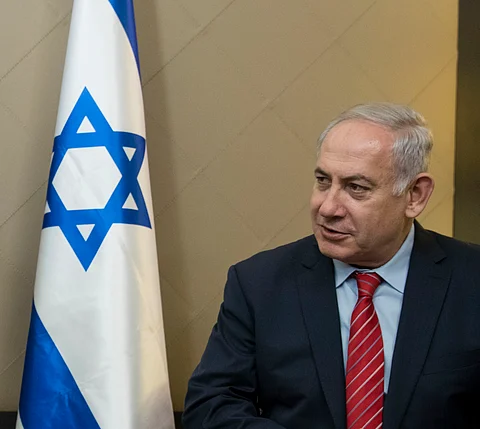

Hamas has urged Arab governments to adopt a unified and unequivocal stance in response to Israeli Prime Minister Benjamin Netanyahu’s recent endorsement of the “Greater Israel” concept, which envisions Israeli sovereignty over vast territories across the Middle East, including parts of Egypt, Lebanon, Syria, Iraq, Saudi Arabia, and Kuwait.
In a statement posted on the group’s Telegram channel, Hamas warned that Netanyahu’s comments “clearly confirm the danger” Israel poses “to all countries and peoples in the region.” The group called on Arab nations to take “serious measures to support our people in Palestine and the Gaza Strip” and appealed to the international community to both condemn the remarks and push for an end to the ongoing war in Gaza.
The controversy arose from an interview Netanyahu gave on Tuesday to Israeli broadcaster i24 News with host Sharon Gal, a former right-wing Knesset member. During the exchange, Gal presented the prime minister with a map he described as depicting “the Promised Land” and asked whether Netanyahu identified with the vision of “Greater Israel.” Netanyahu replied, “Very much,” framing his political role as part of a “historic and spiritual mission” spanning generations.
Although the map was not shown on camera, the “Greater Israel” idea in certain strands of Jewish and Zionist thought is commonly understood as stretching from the Nile River in Egypt to the Euphrates River in Syria and Iraq. This interpretation encompasses much of modern-day Egypt, Saudi Arabia, Iraq, and Syria, as well as all of Lebanon, Jordan, Kuwait, and historic Palestine.
Netanyahu, who leads what many analysts consider the most right-wing and religiously ideological government in Israel’s history, has elevated figures like National Security Minister Itamar Ben-Gvir and Finance Minister Bezalel Smotrich—politicians once considered far-right fringe voices—into central positions of influence.
While Jordan and Saudi Arabia have issued strong condemnations, with Amman urging a “firm stance” from the international community, neither the United Nations nor the Arab League has yet responded formally to Netanyahu’s remarks. Earlier this week, the prime minister also ordered a full Israeli military occupation of Gaza, drawing near-universal criticism abroad.